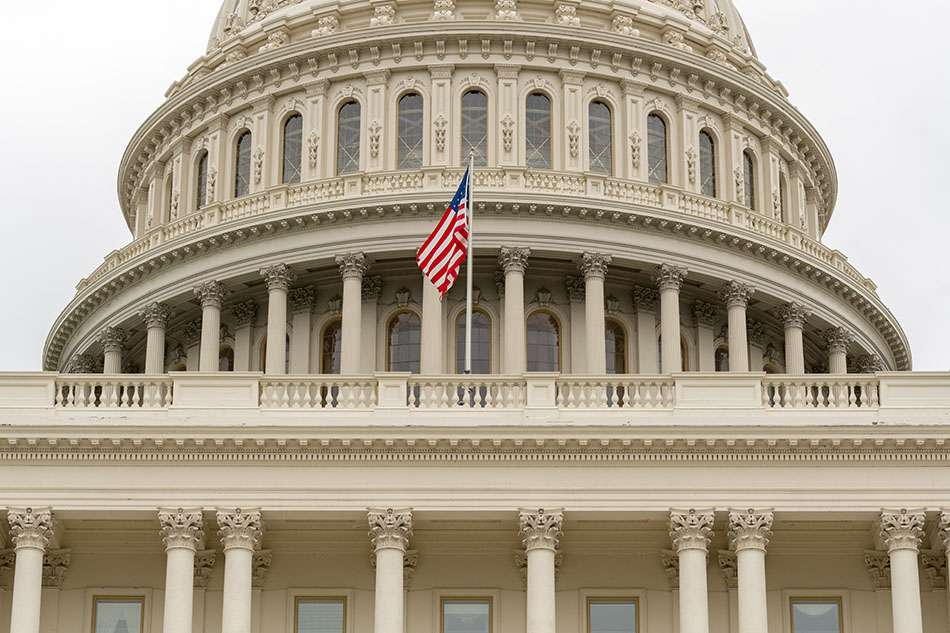
Legislators in Washington, D.C. are working on two infrastructure bills that could have plastics recycling implications. | LLoughran/Shutterstock
A proposed virgin plastics tax of 20 cents per pound has been axed from the Democrats’ social infrastructure bill, according to an industry lobbying firm.
Bracewell Policy Resolution Group, the firm that the Association of Plastic Recyclers (APR) contracts to lobby in Washington, D.C., last week gave an update on legislation moving through Congress. The update came during APR’s October virtual meeting (other experts spoke on the impacts of bills that passed in three West Coast states).
(APR owns Resource Recycling, Inc., publisher of Plastics Recycling Update.)
The Oct. 26 session included a presentation from Yasmin Nelson, a senior principal in the policy resolution group. Prior to joining the firm, Nelson worked in the office of then-Sen. Kamala Harris as an economic policy advisor.
Nelson told APR members that Democrats in Congress are working on two related bills: an infrastructure bill that funds traditional “hard” infrastructure such as roads, bridges, the power grid, and airports; and a social/care infrastructure bill that funds items such as childcare, home care, the child tax credit, affordable housing, and education.
The first has already passed the Senate, but progressives in the House of Representatives are holding it up because they also want Senate passage of the second, Nelson said. In order to pass, the social infrastructure bill must go through a “reconciliation” voting process with the support of every Democrat.
A screenshot of the American Chemistry Council’s paid advertisement on Facebook
The infrastructure bill includes language that was previously in the standalone RECYCLE Act. Sponsored by Republican Sen. Rob Portman of Ohio, the “Recycling Enhancements to Collection and Yield through Consumer Learning and Education” (RECYCLE) Act creates a grants program through the U.S. EPA to fund recycling education and outreach, directs the EPA to develop a model recycling toolkit, and requires the agency to more frequently revise federal procurement guidelines for recycled-content products.
A more controversial proposal, a federal excise tax on virgin plastics used in single-use products, appears to have fallen by the wayside. Also filed as a standalone bill, the proposal from Democratic Sen. Sheldon Whitehouse of Rhode Island would levy a fee of 20 cents per pound in 2024. The plastics industry has assailed the tax with advertising initiatives painting it as an attempt to raise the costs of products for American households.
Some Democrats had been pushing to include the tax in the social infrastructure bill.
“I’ve spoken with a few folks on the Finance Committee and the Ways and Means Committee and they’ve shared that although this was something that was initially, or I should say among, many of the ‘pay fors’ that they shared out there, this is not something that they’re looking to actually do,” Nelson said.
Bracewell is continuing to monitor updates to the social infrastructure bill, but “right now, this is off the table,” she said.
APR President Steve Alexander added that he was disappointed that much of the virgin plastics tax revenue would have been slated to fund the social infrastructure bill.
“Those funds – if in fact they were ever enacted – they need to go to recycling infrastructure,” Alexander said. “They shouldn’t be going to anything else, and I think that would be a big problem for us as we go forward.”
Another controversial bill also appears to have been jettisoned for now. Language from the Break Free From Plastic Pollution Act is not currently included in the social infrastructure legislation. The bill would implement an extended producer responsibility (EPR) program for plastic packaging, create a national beverage container deposit program, ban certain plastic products, impose recycled-content mandates, freeze construction of new plastics production plants, and more.
“There are certain pieces of it being discussed, but at this point it doesn’t look to be included [in the reconciliation package],” Nelson said.
More stories about industry groups
- Q&A: With EPR incoming, end markets are crucial
- NY legislative session ends, again without EPR
- Major plastic initiative sets sights on system change